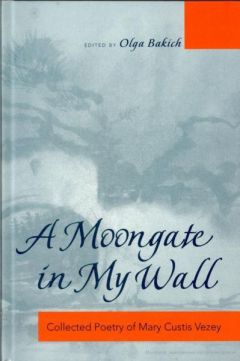280
From the collection Прикосновенье, Munich, 1959 Variant in the first line of the last stanza: «Our world is sick. It whispers invocations».
From the collection Прикосновенье, Munich, 1959.
From the collection Навстречу небу, Frankfurt-on-Maine, 1952.
From the collection Прикосновенье, Munich, 1959.
From the collection Разрозненная тайна, Munich, 1965.
From the collection Навстречу небу, Frankfurt-on-Maine, 1952
Unfinished translation from the collection Вторая книга стихов, Paris, 1928.
Unfinished translation from the collection Вторая книга стихов, Paris, 1928.
Poem not found in a collection of this poet; presumably translated from a publication in a Russian emigre newspaper.
From the collection Южный дом, Munich, 1968.
A.N. Pleshcheev's poem was published with notation «С английского».
From the collection Закат, Paris, 1931.
From the collection Закат, Paris, 1931.
Poem not found in a collection of this poet, presumably translated from a publication in a Russian emigre newspaper.
From the collection Закат, Paris, 1931.
Second part of the poem from the collection Закат, Paris, 1931
From the collection Закат, Paris, 1931.
From the collection Закат, Paris, 1931.
From the collection Закат, Paris, 1931.
From the collection Наедине, Paris, 1938.
Poem not found in a collection of this poet, presumably translated from a publication in a Russian emigre newspaper.
From the collection Закат, Paris, 1931.
Poem not found in a collection of this poet, presumably translated from a publication in a Russian emigre newspaper.
From the collection Наедине, Paris, 1938.
From the collection Стихотворения, Milan, 1977.
From the collection Прозрачная тьма. Стихи разных лет, Livorno, 1969
From the antology Содружество, Washington, 1966.
Poem not found in a collection of this poet, presumably translated from a publication in a Russian emigre newspaper.
Poem not found in a collection of this poet, presumably translated from a publication in a Russian emigre newspaper.
From the collection Тяжелая лира, Berlin, 1923. Variant in the thirty-seventh line in the manuscript: «but doesn't want to keep too from hearing».
Comment by Mary Vezey: «From the Sung Collection.»
Comment by Mary Vezey: «From the Fukiu mountain district of So-Chau, Kiangsu Province. Many centuries old.»
Attributed to Wang Anshi in manuscript. Variant in the fifth line in the manuscript: «Так, к востоку от горной страны».
The translations in this section all come from poems originally printed in Корейские шестистишия, Alma-Ata, 1956. Poems 683–688 come from the cycle «Девять косанских песен», 691–695 are from the cycle «Песни о пяти друзьях», 696–699 from the cycle «Новые песни гор», ami poem 700 from the cycle «Весенние песни рыбаков». The explanations of Korean place names and words are those of the Russian translators, A. Zhovtis and P. Pak Ir.
Variant in the second line in the manuscript: «Has it parted from someone?»
This poem speaks about the time of terror during reign of King Sedyo in the 15th century.
In ancient Korean tales Mount Pon-ne-san is a Mountain of Happy Grasses, where the grass of eternal youth grows.
Variant in the manuscript: «Over the chilly autumn stream / Evening breezes play, / No matter how often I cast my line/ I can catch no fish today./ I have only filled my soory sloop / With all the moonbeams I could scoop.»
Variant in the manuscript: «I made three rooms of day / For myself and for my friends / I live in one, the moon in another, / and the free wind in the third./ But the hills stayed alone / Under open skies in autumn rains».
Kosang is a coastal region in Korea; Chu Xi (1120–1188) was a Chinese Confucian philosopher, and Mu Yi his native village.
Ilgok was the First Bend in the river and the place name. Variant in the fourth line in the manuscript: «And the mountains have floated up on the horizon».
Igok was the Second Bend in the river.
Samgok was the Third Bend in the river.
Sagok was the Fourth Bend in the river. Variant in the fourth line in the manuscript: «Reflects the mountain tops and majestic woods».
Ogok was the Fifth Bend in the river. Variant in the fifth line in the manuscript: «The Forest Screen breathes of resin».
Variant in the fifth line in the manuscript: «Dusk has settled upon the darkened water».
A space is left in the manuscript for the translation of the Russian word «ogarok» in the fifth line: «Но огарок свечи no утра додымится».
Variant in the manuscript: «Exiled by enemies to far Gangho, / In loneliness five loyal friends I found: / Water, Bamboo, a Cliff, a Pine, the Moon / That rises over yonder distant mound, / No calumny will sway them to betrayal, / In lofty friendship they will never fail».
The word «chihbi» means a hut
A space is left in the third line in the manuscript for the translation of the Russian word «целомудренный».




